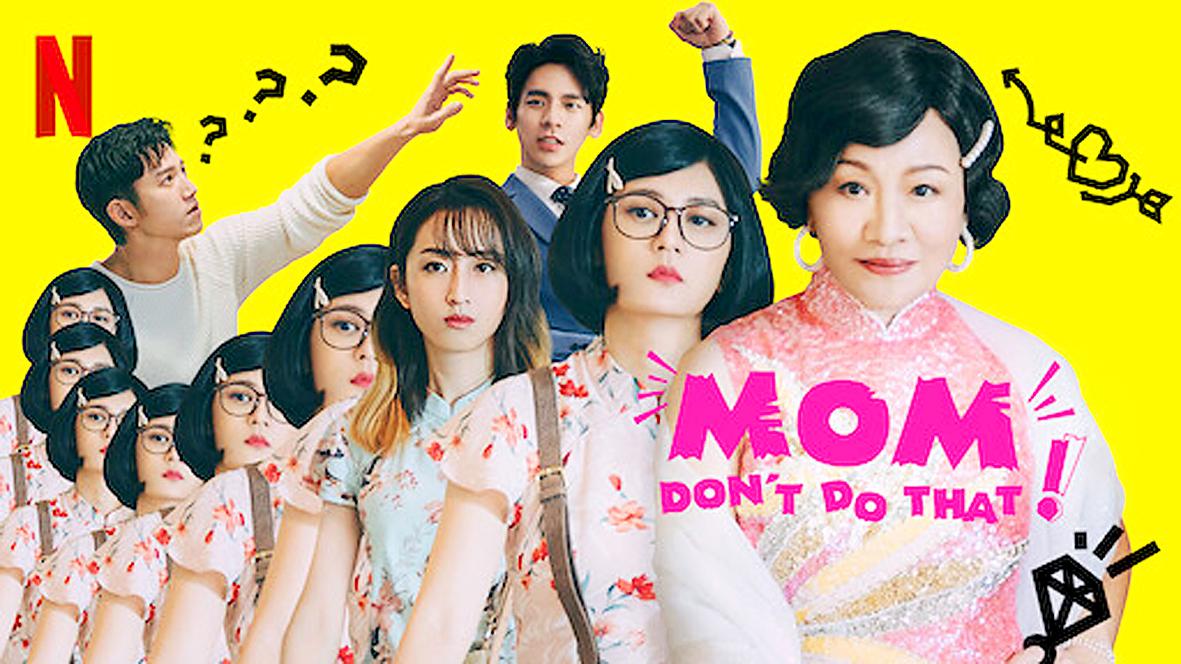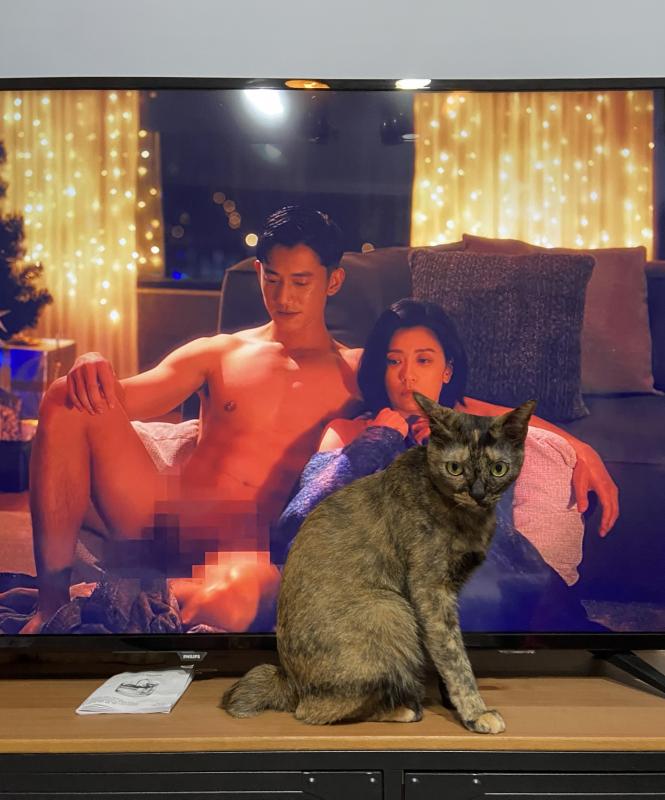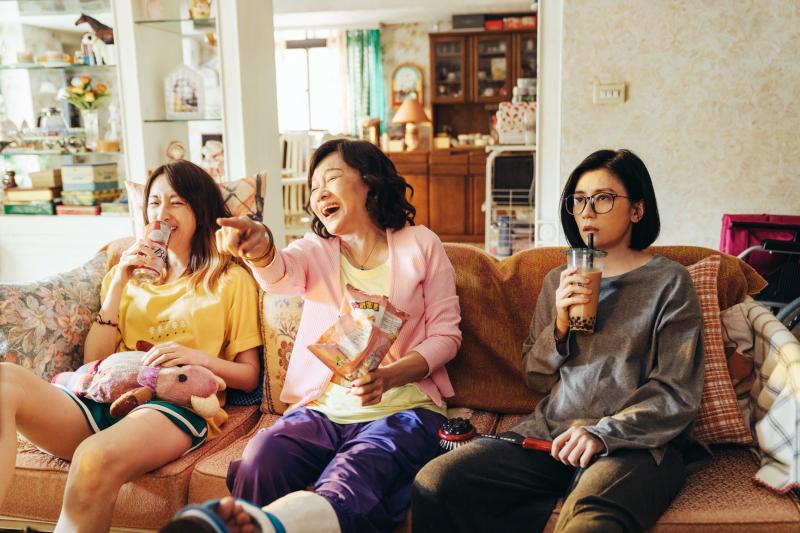The plot intrigues and the jokes abound, but the best part of Mom, Don’t Do That (媽別鬧了), currently available on Netflix, is the realistic portrayal of the relationship between the three main characters: mother Wang Mei-mei (Billie Wang, 比莉) and her two daughters: Chen Ru-rong (Alyssa Chia, 賈靜雯) and Chen Ruo-ming (Ko Chia-yen, 柯佳嬿).
Taiwanese culture permeates the show, playing off common cultural themes such as family pressure to marry by a certain age.
Dirty jokes abound, using slang that the English subtitles can’t fully convey. “Frying rice” as a euphemism for sex had to be explained to me by my mom, who grew up watching these famous actresses in serious romantic dramas.

Photo courtesy of Netflix
The series revolves around Mei-mei’s international quest to remarry — and her constant criticisms of her daughters for not being able to find a husband. Her daughters, meanwhile, chide her for many questionable decisions while on the hunt for a man.
It’s a familiar way for Taiwanese families to express their love: nagging, wanting a loved one to be better and to have the best.
Their jabs are savage, expecting the target to fight back with exaggerated confidence. But the one time Mei-mei doesn’t retort, Ru-rong knows something is wrong.

Photo: Deanna Durben
Humor coats everything from serious topics, like a cheating boyfriend, to glitzy high school reunion antics (the only sideplot in the show that I disliked, a quickly resolved confrontation with a blatant moral angle).
Mei-mei’s ability to compulsively throw herself into new situations, as well as laugh at herself when she fails, is a central message of the show.
“Getting scammed is just getting scammed. You get thick skin as you get old, just cry and laugh it off,” she says when Ru-rong worries for her emotional state.

Photo courtesy of Mom Don’t Do That Facebook page
Fall in love — but not blindly, the show demonstrates through the interweaving storylines and conversations.
Mei-mei is not afraid to walk away when her boundaries are crossed. She is dating to marry, and won’t waste time with someone who doesn’t value her, although her habit of jumping to conclusions results in a few misunderstandings.
Younger daughter Ruo-ming’s reluctance to abandon a cheating boyfriend who leeches off her is portrayed with sympathy.
Similarly, Ru-rong’s reluctance to date is a great storyline, and her various reasons for staying single, whether borne out of fear or career commitment, are explored throughout the series. It is significant that her ending wasn’t treated as a failure.
“‘I love you’ has two meanings,” Ru-rong posits. “One means I want you to make sacrifices, the other means I’ll sacrifice for you. Unless you’re sure which one they mean, never reply ‘I love you too!’”
Great advice is nestled among the crazier storylines. Her fantastical romance subplot was both cheesy and entertaining.
Each nuanced character goes through their own journey, as the three women figure out how to move on with their lives while still remembering their deceased family patriarch. Mei-mei whirls through a seemingly crazy romance, while her daughters slowly realize who they are and what they actually need.
It’s not a happy ever after tale, but it feels real. This warm-hearted comedy is definitely worth a watch.

Jacques Poissant’s suffering stopped the day he asked his daughter if it would be “cowardly to ask to be helped to die.” The retired Canadian insurance adviser was 93, and “was wasting away” after a long battle with prostate cancer. “He no longer had any zest for life,” Josee Poissant said. Last year her mother made the same choice at 96 when she realized she would not be getting out of hospital. She died surrounded by her children and their partners listening to the music she loved. “She was at peace. She sang until she went to sleep.” Josee Poissant remembers it as a beautiful

For many centuries from the medieval to the early modern era, the island port of Hirado on the northwestern tip of Kyushu in Japan was the epicenter of piracy in East Asia. From bases in Hirado the notorious wokou (倭寇) terrorized Korea and China. They raided coastal towns, carrying off people into slavery and looting everything from grain to porcelain to bells in Buddhist temples. Kyushu itself operated a thriving trade with China in sulfur, a necessary ingredient of the gunpowder that powered militaries from Europe to Japan. Over time Hirado developed into a full service stop for pirates. Booty could

Lori Sepich smoked for years and sometimes skipped taking her blood pressure medicine. But she never thought she’d have a heart attack. The possibility “just wasn’t registering with me,” said the 64-year-old from Memphis, Tennessee, who suffered two of them 13 years apart. She’s far from alone. More than 60 million women in the US live with cardiovascular disease, which includes heart disease as well as stroke, heart failure and atrial fibrillation. And despite the myth that heart attacks mostly strike men, women are vulnerable too. Overall in the US, 1 in 5 women dies of cardiovascular disease each year, 37,000 of them

Politically charged thriller One Battle After Another won six prizes, including best picture, at the British Academy Film Awards on Sunday, building momentum ahead of Hollywood’s Academy Awards next month. Blues-steeped vampire epic Sinners and gothic horror story Frankenstein won three awards each, while Shakespearean family tragedy Hamnet won two including best British film. One Battle After Another, Paul Thomas Anderson’s explosive film about a group of revolutionaries in chaotic conflict with the state, won awards for directing, adapted screenplay, cinematography and editing, as well as for Sean Penn’s supporting performance as an obsessed military officer. “This is very overwhelming and wonderful,” Anderson